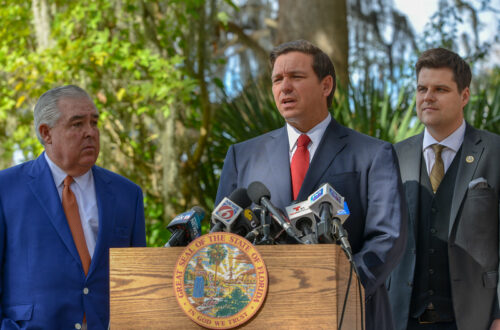In 2018, only 16.4% of high school students in the country were required to take a financial literacy course. Now, that number is projected to jump to 32.5%.
On March 22, Gov. Ron DeSantis, R-Florida, signed a bill that mandates a financial literacy course for high school students, making Florida the largest state to require one. Prior to this, the bill passed the Florida Congress unanimously.
The law, officially titled the “Dorothy L. Hukill Financial Literacy Act,” requires students entering high school during the 2023-2024 academic year to take a half-credit financial literacy and money management course. The curriculum includes an overview of how to open and manage a bank account, balance a checkbook, complete a loan application and compute federal income taxes.
“Financial literacy is an important life skill for a student to have. Ensuring our students have the skills to manage their finances and perhaps one day own a business will pay dividends for our state,” said DeSantis.
The push for a high school financial literacy course came from late Sen. Dorothy Hukill, who introduced legislation to make the course a requirement during five different sessions. Hukill had plans of reintroducing her bill for a sixth time before passing away from cancer in 2018. Her colleague, Sen. Travis Hutson, R-Flagler, sought to pass the bill in her memory.
“Senator Hukill was a personal friend, and it is my deepest honor to fulfill her legacy,” said Hutson.
Prior to this course now becoming a statewide requirement, various counties have already implemented their own financial literacy programs.
For example, Broward County first approved a financial literacy program in 2015. Those efforts led to Broward County making the course a graduation requirement in 2021.
“Broward County Public Schools values and embraces the new high school financial literacy graduation requirement and is committed to ensuring that all students graduate from high school with the financial literacy skills they need to succeed,” Patricia Good told the Florida Political Review. Good is the Vice Chair of the Broward County School Board.
For the past six years, research from George Washington University’s Global Financial Literacy Excellence Center shows that Americans have a poor level of financial literacy. In particular, their 2022 average indicates that only half of Americans responded to the center’s index questions correctly.
Further research from the GFLEC indicates that those with very low levels of financial literacy are six times more likely to have difficulty making ends meet.
In addition, a recent survey by the National Endowment for Financial Education shows that 88% of adults support a financial literacy course requirement in their own respective states.
Other states have taken note of Florida’s actions. Georgia became the latest state to require a financial literacy course. South Carolina, Michigan, Minnesota and New Hampshire are also poised to pass legislation that would require these courses.
The new requirement comes in the midst of various educational reforms undertaken by the DeSantis administration. In the same month, DeSantis signed into law a new assessment system that overhauls the Florida Standards Assessment in favor of a new progress-monitoring system titled “Benchmarks for Excellent Student Thinking.”
On March 28, DeSantis signed the Parental Rights in Education Act, dubbed as the “Don’t Say Gay” bill, which prohibits instruction on gender identiy and sexual orientation in kindergarten through third grade classrooms.
“Every student should learn financial literacy before they graduate and start making real life financial decisions. I cannot thank the governor enough for not only signing the bill, but for also helping Florida’s graduates be better prepared for tomorrow’s future,” Hutson told the Florida Political Review.
Check out other recent articles from Florida Political Review here.
Featured Image: Close-up of calculator, hand, pen and financial statement. Unmodified photo by Dave Dugdale used under a Creative Commons license. (https://bit.ly/3F869Ud)






One Comment
Tim Ranzetta
Thank you for including data from the NGPF 2022 State of Financial Education Report in your opening paragraph. Here’s the complete report: https://www.ngpf.org/state-of-fin-ed-report-2021-2022/